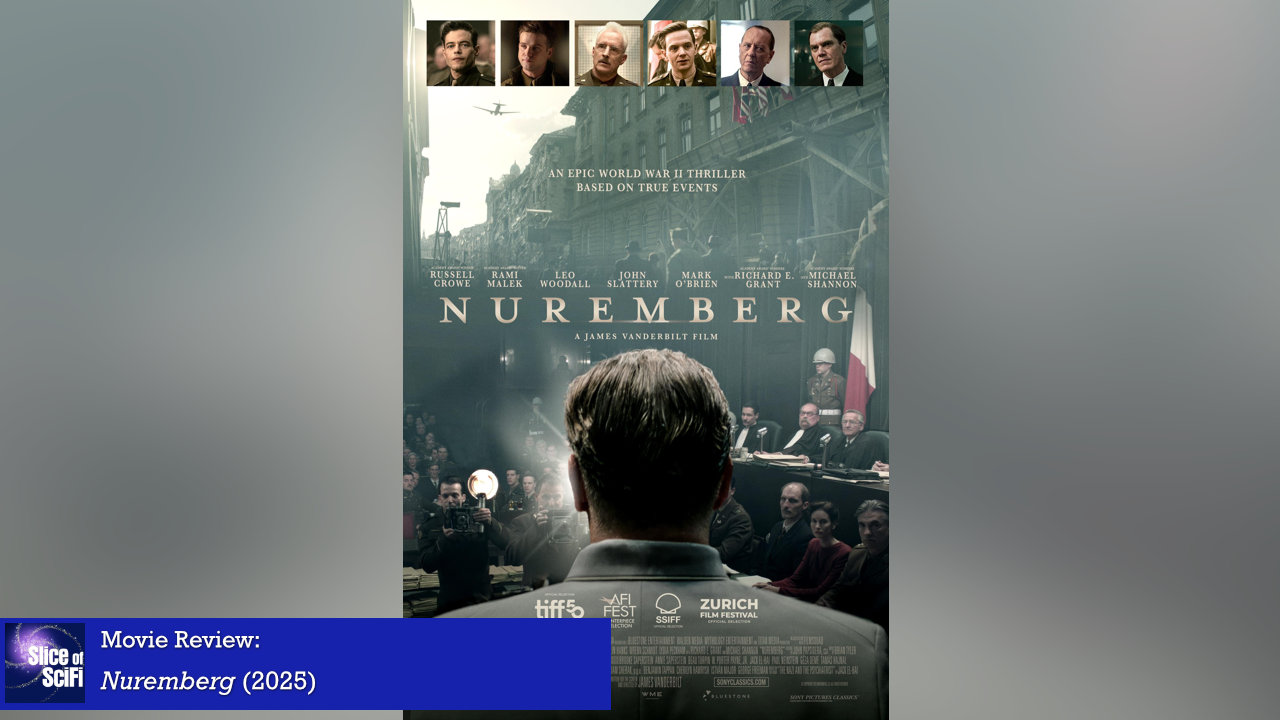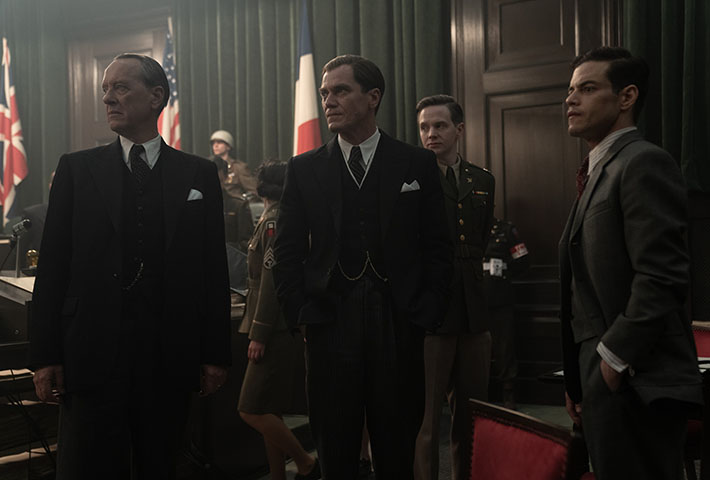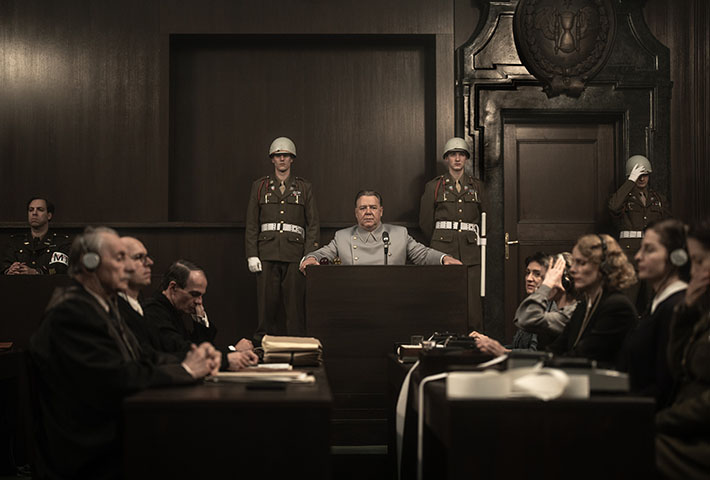“Nuremberg” is a film that has two command performances from Russell Crowe and Rami Malek as adversaries. Documenting some aspects of the Nuremberg war crimes tribunal after the defeat of the Nazis in World War II, the movie effectively shows the difficulties Associate Justice of the Supreme Court Robert Jackson faced in getting the trials going. The picture has a somber tone throughout as the atrocities committed by the Nazis are depicted in film and the unrepentant prisoners refuse to assume responsibility for their crimes against humanity.
World War II is over in Europe. Hitler and some of his deputies have committed suicide. In Austria, a car pulls up on some American troops. They hold it at bay with weapons. Eventually Reichsmarshall Hermann Göring (Russell Crowe) emerges. As he surrenders, he tells the G.I.s to take his luggage.
Army psychiatrist Douglas Kelley (Rami Malek) is on a train, having been summoned for an unknown reason. He shows card tricks to an attractive female cabin-mate.
They arrive at Mondorf, Luxembourg. Kelley is met by Sgt. Howie Triest (Leo Woodall) who takes him to Camp Ashcan (the Palace Hotel). Col. Andrus (John Slattery) informs Kelley that he has been tasked with doing psychological interviewing of the senior Nazi officials who are awaiting trial.
In the United States, Associate Justice of the U.S. Supreme Court Robert H. Jackson (Michael Shannon) is anxious to convene a war crimes tribunal to judge the Nazis for their war crimes. This is without precedent. Most nations believe that international law condones staying out of other nations’ business. Jackson, however, wants to create a deterrent for the future by convicting and then executing those found guilty of atrocities.
Jackson faces opposition from Congress. Some members want the Nazis to just be executed without trials. Others fear giving the Nazis a public platform to convert others to their cause and to instigate anti-Semitism. President Truman is willing to along with Congress. Complicating matters is that Jackson is being considered for a Supreme Court Chief Justice position.
Back at Camp Ashcan, Kelley meets Göring for the first time. Triest is along as the translator; his mother spoke German and he became fluent in it. Göring purportedly does not speak English. But when Kelley calls him “Fatso,” Göring reacts.
After Jackson visits the Pope, the Nuremberg tribunal is approved. The trials will be held at the Palace of Justice, in the city where the anti-Semitic Nuremberg laws were adopted. Twenty-two Nazis will be on trial.
Kelley’s relationship with Göring is moving along. Kelley visits Göring’s family in hiding and transmits correspondence between them as a way to get closer to the #2 Nazi in the Reich.
As the site for the trials is being rebuilt, Kelley becomes convinced that it would be a disaster to put Göring on the stand. The Reichsmarshall is a crafty narcissist who could twist things in his favor and do more damage than good.
Can Kelley convince Jackson to keep Göring off the stand?
One interesting thing about this film is that Douglas Kelley did indeed exist. In the movie he talks about writing a book about his experiences, which he eventually does. This film is not based on Kelley’s book but on another text, “The Nazi and the Psychiatrist,” by Jack El-Hai
The movie delineates how difficult it was to get the trials underway. I appreciated the realpolitik aspects of the endeavor. It would have been nice, though, if more time had been spent on this story. I also was disappointed by the lack of identification of Congressmen speaking to Jackson. We know nothing about who they are or why they are or are not obstacles to the process.
As in most fictional movies, one has to take the actual courtroom scenes with a grain of salt. Their purpose is usually to highlight dramatic facets of the trial at the expense of legal realities. In “Nuremberg,” there also is the added possibility of the trial scenes not conforming to the actual transcripts or the film footage. I cannot be the judge of the historical accuracy nor do I care since I am not watching a documentary.
The scenes with Kelley and the Nazi prisoners are compelling. Here you have the worst of the worst of humanity. Often they are unrepentant. It is interesting to see Kelley at work with his inkblots and questions.
But it is his relationship with Göring that is the most intriguing. At first they play a cat-and-mouse game but gradually become more friendly. These are made the more compelling because of two great performances.
Russell Crowe has become much more nuanced as an actor as he has aged. He perfectly captures the arrogance, the haughtiness, the charm, and the evil that was Hermann Göring. It is hard to dislike this monster at times. There is no tour-de-force scene per se. Rather it is a steady output of assured acting.
Malek plays a complex character and is masterful in his portrayal. On the one hand, Kelley is a psychiatrist who is very good at his profession. On the other hand, he is willing to break the rules and has the ambition to become famous with a book about his interviews with the Nazis. He routinely seems to break Army rules as well as patient-client privilege. His desire to know the inner workings of the Nazi mind are convincingly shown as are his human frailties.
Another performance worth nothing is Leo Woodall as Sgt. Howie Triest. He does have one tour-de-force scene which alone makes watching this movie worthwhile. He is mostly in the background as Kelley’s aide and voice of reason. But even in these moments, he projects purposefulness.
One cautionary note: there is a segment at the trial where grisly and gruesome depictions (from real footage) are displayed on film. The horror of these historical records cannot be understated.
All in all, I found this film to be worth watching for its new treatment of an aspect of the Nuremberg trials and for its stellar acting performances.
Four out of five stars
The Allies, led by the unyielding chief prosecutor, Robert H. Jackson (Michael Shannon), have the task of ensuring the Nazi regime answers for the unveiled horrors of the Holocaust while a US Army psychiatrist (Rami Malek) is locked in a dramatic psychological duel with former Reichsmarschall Herman Göring (Russell Crowe).
Starring: Russell Crowe, Rami Malek, Leo Woodall, John Slattery, Mark O’Brien, Colin Hanks, Wrenn Schmidt, Lydia Peckham, with Richard E. Grant, and Michael Shannon
Written & Directed by: James Vanderbilt
Based on the book: The Nazi and the Psychiatrist by Jack El-Hai
Website: nuremberg-film.com
"Nuremberg": notable performances and compelling dynamics shine
Summary
As in most fictional movies, one has to take the actual courtroom scenes with a grain of salt. Their purpose is usually to highlight dramatic facets of the trial at the expense of legal realities. In “Nuremberg,” there also is the added possibility of the trial scenes not conforming to the actual transcripts or the film footage. I cannot be the judge of the historical accuracy nor do I care since I am not watching a documentary.




Leave a Reply